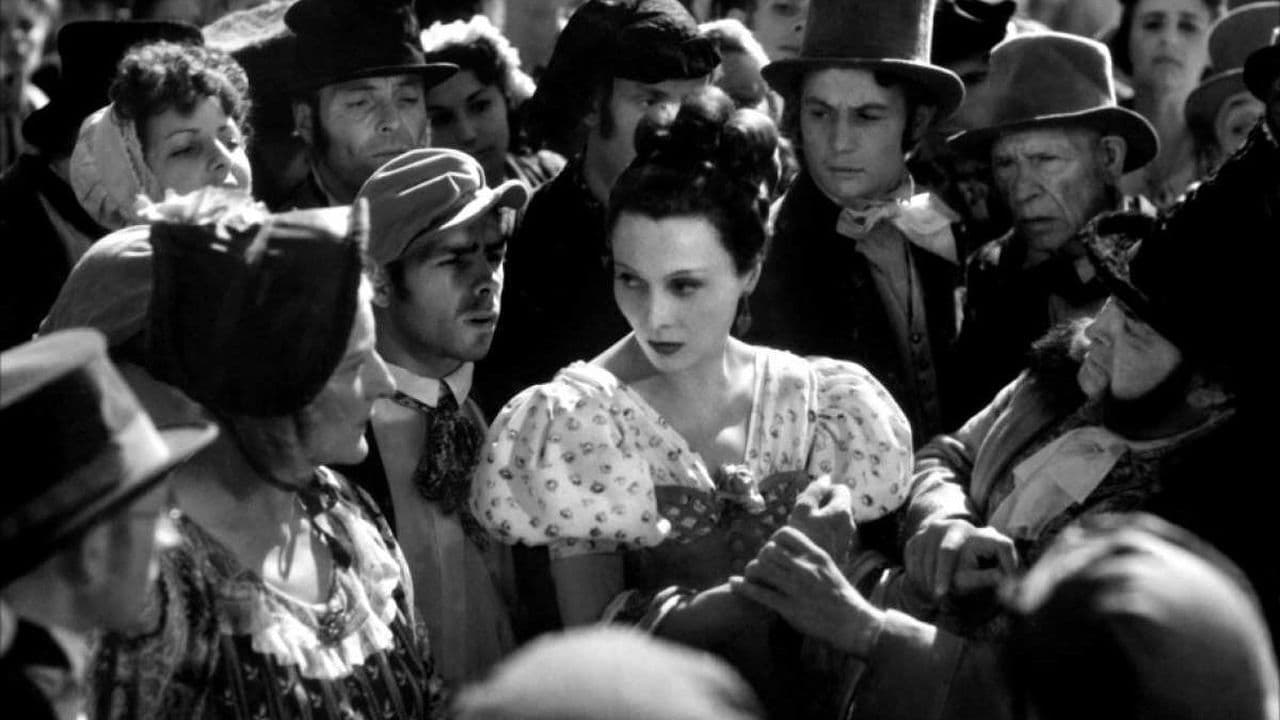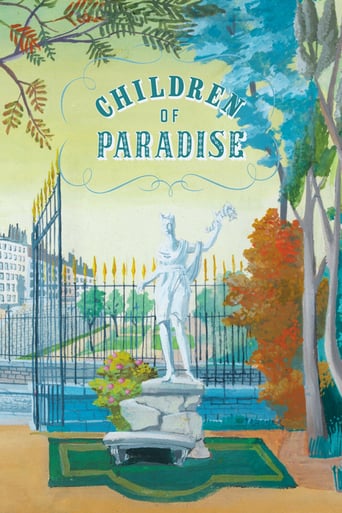Steineded
How sad is this?
Stevecorp
Don't listen to the negative reviews
StyleSk8r
At first rather annoying in its heavy emphasis on reenactments, this movie ultimately proves fascinating, simply because the complicated, highly dramatic tale it tells still almost defies belief.
Dana
An old-fashioned movie made with new-fashioned finesse.
jadavix
"Children of Paradise" would be an extraordinary achievement, even if it didn't break records in production. For one thing, it came out of nazi occupied France; the film saw fascist sympathisers working alongside French resistance operatives on screen. However, we don't require this historical footnote to understand the French film's legacy.It was the most expensive movie made in France up to that point, and one can really see the money up there on screen. The movie appears to have been shot on enormous sets. The effect of this is twofold; not only do we envision ourselves as standing among the characters in 1820s Paris, the design is ornate enough to produce an element of dreamlike whimsy, too.This is an extraordinary filmic achievement, and "Les enfants du paradis" perhaps offers an experience like no other. How they could create a living, breathing world, and yet still not stop you from appreciating the staging of it; how they could allow you to get lost in the "Boulevard of Crime", and then recognize their characters amongst the teeming masses.You may wonder, then, why I didn't give "Les enfants du paradis" a higher rating. The answer is, I'm afraid, that my modern-day attention span was just too taxed by the film; my attention seriously waned during the second half. I was impressed by the way the actors did not vanish amongst the labyrinthine sets; rather they seem perfectly at home there. I was less impressed by my general lack of interest in the story.
Jackson Booth-Millard
From the book 1001 Movies You Must See Before You Die this was a distinctive title for a French film, and while watching it I remembered the most memorable scene shown in the documentary The Story of Film: an Odyssey, so there was good reason to watch it. Basically actress and woman-about-town Claire Reine, who calls herself Garance (Arletty) has numerous men falling at her feet and in love with her, including the significant ill-fated relationship with theatre mime Jean-Baptiste Debureau (Jean-Louis Barrault), and also pretentious actor Frédérick Lemaîtr (Pierre Brasseur), conniving thief Pierre François Lacenaire (Marcel Herrand) and Count Eduard of Montray (Louis Salou). Baptiste has his own dilemma as well, as actress Nathalie (María Casarès) is in love with him, it was when Garance was accused of stealing a watch that she and he met, and Count Eduard protects her when she may have been arrested for the crime of Lacenaire. Years of separation for them, the real loving couple end up in relationships with the people they do not truly love, Baptiste with Nathalie who have a baby son together and goes on to become famous for his mime acting, and Garance with the Count and wants to find her true lover again. The couple do manage to spend a night together, even after Nathalie's attempt to sabotage their meeting by sending her child to foil it, while Count Eduard is discovered murdered, he was killed by Lacenaire. In the end Baptiste is separated from his love again after disappearing in the crowd who are running to escape an attack, and Garrance is forced to leave town in a carriage, completely oblivious to the fact that the Count is dead. Also starring Pierre Renoir as Jéricho the old clothes, Etienne Decroux as Anselme Debureau and Fabien Loris as Avril – Lacenaire's assistant. The acting, particularly from Arletty as the woman caught in a web of relationships and Barrault as the actor who is brilliantly expressive and funny with his silent act, I will confess that it was hard to follow all of what was going on, but that memorable scene of the comedy mime actor describing in silence the mistaken theft of the watch is fantastic, and there are other good moments, overall it is elegant classic period drama. It was nominated the Oscar for Best Writing, Original Screenplay. Very good!
kenjha
This drama explores the relationships of a group of Parisians. The filmmakers are operating under the theory that great length equals great film. It seems as though about half an hour of the film is devoted to stage performances that serve no purpose other than padding the running time. Carne does a good job of conveying the hustle and bustle of Paris in the 19th century. It gets off to a good start, with colorful characters and smart dialog. After the intermission, however, it turns into a dreary soap opera that undermines the whole effort. The plot is too thin to sustain an epic length. An hour could easily have been trimmed. The performances are good by the entire cast.
hasosch
It is a fantastic and poetic world which Marcel Carné has presented to his public in his limited number of movies, almost everyone a masterpiece on its own. A world, in which fantasy and poetry have magical power. There is no gesture, no mimics, no sign without a meaning, a little character can change a world. Insofar, Carné is a late heir of Novalis. According to him, the sign is necessarily bound to its object, there is no arbitrariness and no convention. There is a "sympathetic abyss" between sign and object, and at the beginning of the creation of every sign therefore stands the Great Sign Creator, God. So, every syllable, every twitch and flutter and flicker and bicker and flash is a message from Heaven. No wonder, that in such a world practically everything is possible. And no wonder, that the gigantic fairground which Carné presents in his epochal "Les Enfants Du Paradis" is a world in the world that is protected by the Sublime. I even think that Carné's typical style, which is the style of a merciful and enchanted marionette-player, shows that the sense of life does not consist in enforcing everyone's alleged free will, but to learn how to communicate, to interpret and to act in this highly artistic semiotic world. Nietzsche had written that he supports an anti-metaphysic world-view - as long it is artistic.

